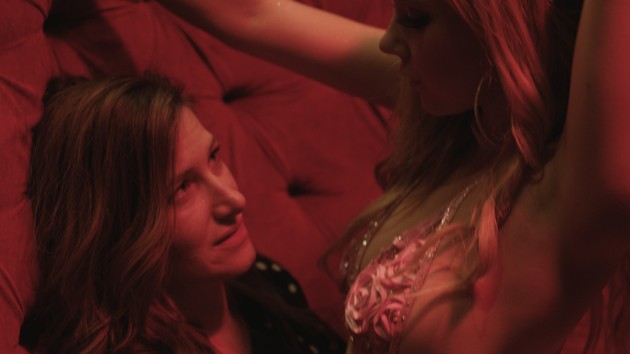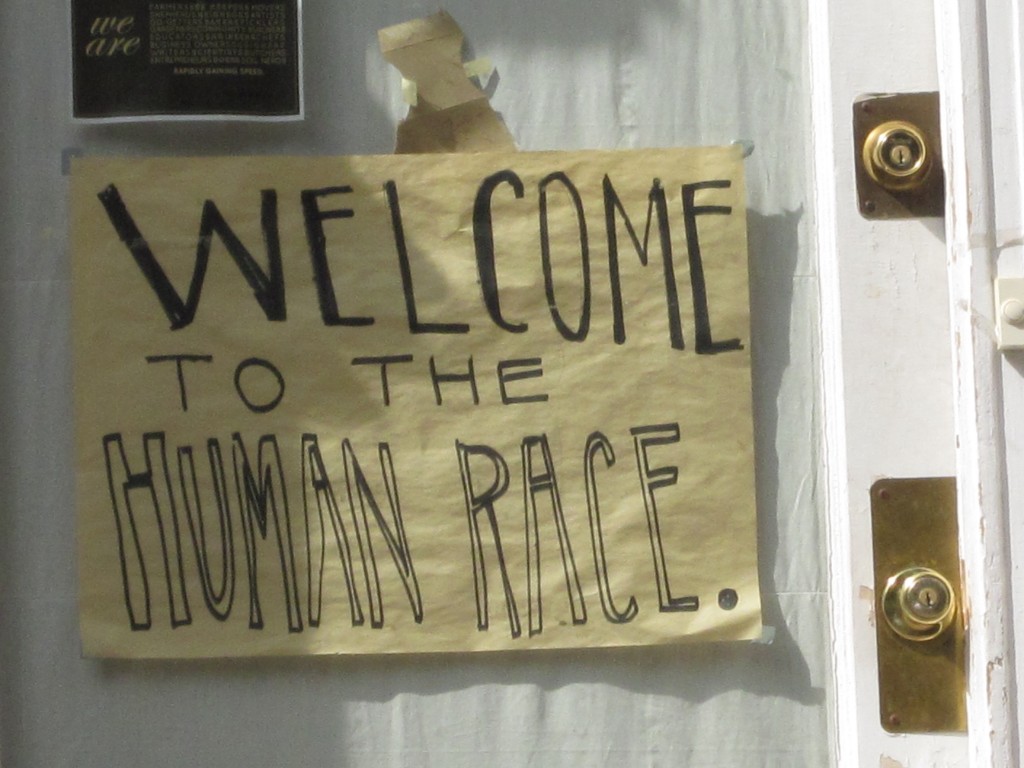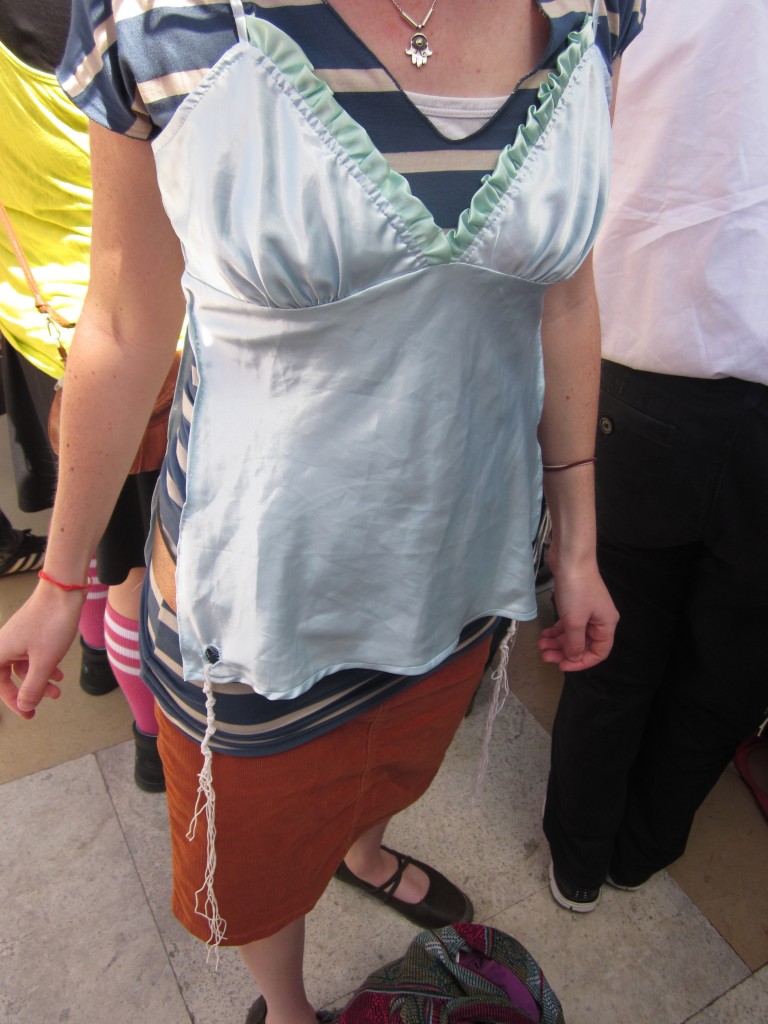Author Archives: Merissa Nathan Gerson
September 17, 2013 by Merissa Nathan Gerson
Sex in Silverlake
 Leave it to feminist power-Jew Jill Soloway (Six Feet Under, United States of Tara) to take a sex worker and have her inadvertently revive a Silverlake couple’s Jewish practice. This is ultimately what happens in Soloway’s first feature film, “Afternoon Delight” which just came out in theaters. The film is about a sexless Los Angeles marriage and the idea to revamp the couple’s bedroom by heading to a strip club. Of course, the wife woos the lap-dancing stripper, McKenna, into moving in as “the nanny” and proceeds to learn from her about the world of sex work, not to mention the world of receiving actual tender care.
Leave it to feminist power-Jew Jill Soloway (Six Feet Under, United States of Tara) to take a sex worker and have her inadvertently revive a Silverlake couple’s Jewish practice. This is ultimately what happens in Soloway’s first feature film, “Afternoon Delight” which just came out in theaters. The film is about a sexless Los Angeles marriage and the idea to revamp the couple’s bedroom by heading to a strip club. Of course, the wife woos the lap-dancing stripper, McKenna, into moving in as “the nanny” and proceeds to learn from her about the world of sex work, not to mention the world of receiving actual tender care.
What proceeds is a visible split between the life of Jewish community and Jewish stay-at-home moms, and the world of sex work, of McKenna’s job as a prostitute and as stripper which affords the lead, Rachel, an exit from her stifled life. The Jewish community center and Jewish school are the meeting points for Rachel and the other super-moms, and their fundamental role is the role of giver, of caretaker, of being mothers and community builders. Sex and sexuality, the way Soloway draws it in this film, is notably separate from this world of Jewish female as nurturer.
Rachel’s rat pack of four moms are repeatedly seen entering and exiting their children’s school in unison, a la “Mean Girls,” a la “Heathers,” a la every high school film that ever rocked. These are the girls grown up. These are the housewives who once wanted to be big writers. These are the modern day “stepfords,” and the only remedy in this film to the dissatisfied life of Rachel is exiting to a world where sex means money and ownership, where sex means power.
- No Comments
August 27, 2013 by Merissa Nathan Gerson
Miley Cyrus and a Whole Lot of Wrong
 I have what I am going to term Miley fever. It started when I began watching the VMA replays and there she was, in her horrible glory, an emblem of America’s worst social ills. Then, what followed, an obsessive reading and re-reading of the articles meant to illuminate what we had just witnessed. And one by one I realized the writers were themselves exhibiting subtle sexism and racism of their own. Is Miley the social ill, or is she the catalyst to revealing our deepest issues?
I have what I am going to term Miley fever. It started when I began watching the VMA replays and there she was, in her horrible glory, an emblem of America’s worst social ills. Then, what followed, an obsessive reading and re-reading of the articles meant to illuminate what we had just witnessed. And one by one I realized the writers were themselves exhibiting subtle sexism and racism of their own. Is Miley the social ill, or is she the catalyst to revealing our deepest issues?
It wasn’t just the sideways tongue, or the bad costumes, or the wannabe Katy Perry set. It wasn’t the poor allusions to Britney, or the fact that there was little to no actual dancing happening on that stage. It was the basic fact that first and foremost, not even naked and alone, not even on the most intimate of beds would anyone want to see or experience those lewd moves. They weren’t sexy, they weren’t strip club worthy, they weren’t elegant, they weren’t really anything. There was a kid on stage with a lot of stuffed animals dressed as black women, or black women dressed as stuffed animals, and she was acting out everything she learned and didn’t learn on TV.
- 2 Comments
December 6, 2012 by Merissa Nathan Gerson
German and Soldier, Falling in Love
 It was two AM on a Sunday evening, and I found myself with a German woman and a male former U.S. soldier on a Tel Aviv beach. My life has a way of scooping me up and placing me in places, beautiful places, with beautiful but complex people. It was no simple après-midnight gathering. It was a post-bar, post-language-class indulgence in English.
It was two AM on a Sunday evening, and I found myself with a German woman and a male former U.S. soldier on a Tel Aviv beach. My life has a way of scooping me up and placing me in places, beautiful places, with beautiful but complex people. It was no simple après-midnight gathering. It was a post-bar, post-language-class indulgence in English.
We were in Israeli Ulpan and we were to speak Hebrew, rak iyvrit. But there were not enough Hebrew words to navigate sensitively the space holding three worlds: one German, one Jewish, one American military all in the state of Israel. We wanted, I wanted, not they to talk about the Holocaust.
I don’t know exactly how or why it happened but we had been honest all night and it was just the three of us and they, the German and the solider, were falling in love, and so by osmosis I was falling in love and I needed, desperately, to unveil my little heart.
That unveiling involved shedding a layer and revealing a giant hole left by a trip to Poland. Beneath a blanket of stars on three folding beach chairs I used their ears and my mouth and I poured a tall glass of Holocaust memory. I told them about my father. I told them about the Siberian labor camps and the displaced person’s camp and I told them about Poland, post-war. I told them about my Jewish family having no place in this world until they arrived illegally in America in 1950 with false names. I told them about my father’s favorite party-wear, his DP camp rations card, and I told them about the graves in Poland, about Belzec and the incomprehensibility of everything I was saying. I told them how I was only beginning to understand, only beginning to let the pain in, just in time to let it out.
The soldier was silent for a very long time, and then the German girl spoke and she cried a little and said she knows, she knows it is unknowable. I realized listening to her that she understood what I understood which was that it was all too much to digest with this mind, this heart, this English language. We needed Hebrew and German, military speech, civilian speech and the words of politics, of religion, and beyond to even start to piece things together. We were learning Hebrew to decode the matrix of horror and its delicate entrance into what had become our supremely non-horrific lives.
- No Comments
November 15, 2011 by Merissa Nathan Gerson
A-Salaam Alaykoum
 Somewhere between San Francisco and Berkeley I developed a craving for hummus. Not hippie grocery hummus, not coffee shop hummus, not deli hummus but hummus, the real deal. I took a gamble with a Google search on my cell phone and followed it far down San Pablo Avenue all the way to a small place called Zaki Kabob House.
Somewhere between San Francisco and Berkeley I developed a craving for hummus. Not hippie grocery hummus, not coffee shop hummus, not deli hummus but hummus, the real deal. I took a gamble with a Google search on my cell phone and followed it far down San Pablo Avenue all the way to a small place called Zaki Kabob House.
Zaki, of course, was closed upon arrival. I stood outside a bit annoyed and a bit frustrated and then decided to go in anyway, pushed the door, and I was quickly inside the closed restaurant. A young woman in a hair net came out and I said, defeated, “You are closed, aren’t you?” And she answered a curt, “yes.” And then another woman appeared, a beautiful woman in her late 50’s with a full head scarf and warm hazel eyes.
I told her I knew they were closed, but maybe I could just buy some hummus? I smiled and she looked at me like I was her own daughter and said, “of course.”
“You know,” she said, “you look just like my niece. You even talk like her.”
I said, “I miss my mother, I want her hummus.” She said, “Where are you from?” and I answered a hesitant, “I am Jewish.” It went on from there, about my mother’s food and its complex relationship to Jerusalem, to Lebanese food, to food of all walks but for certain, hummus, the homemade, tahini-thick real deal.
She shared with me that she had just come from Jerusalem. “We call it Palestine, you call it Israel.” There was a very un-American recognition of Jewish agency in the equation. “It is G-d’s land,” she said, “When we all die it returns to G-d, it does not belong to anyone.” She had come from East Jerusalem and I said I had never been there, only to Bethlehem, shaking my head at the sadness of that place. “Is it as bad as Bethlehem,” I asked? “No,” she answered, “there is life in East Jerusalem. You can breathe.”
- 1 Comment
October 24, 2011 by Merissa Nathan Gerson
The Satin Kippah
 Recently at a gas station I saw a kippah on the security camera. It struck me as odd and exciting to see not only a kippah but a woman with a kippah at a Berkeley, CA gas station. It took a moment to register the black dress, the pink belt, and a wave of fear arrived when I realized the woman in the security camera was me.
Recently at a gas station I saw a kippah on the security camera. It struck me as odd and exciting to see not only a kippah but a woman with a kippah at a Berkeley, CA gas station. It took a moment to register the black dress, the pink belt, and a wave of fear arrived when I realized the woman in the security camera was me.
I took a job at a Masorti Conservative congregation’s Hebrew School earlier this year. Part of the job description included a clause that I was to wear a kippah while teaching Torah, while in the synagogue sanctuary, or while eating. The expectation was welcome after a year in a Modern Orthodox community where my sporadic use of a kippah never failed to garner laughter and shock, and sometimes a feminist nod.
On the contrary, at this Masorti synagogue I am obliged to wear one and fit in just fine. But when I exit the building, almost immediately, I make a point to remove the kippah. The only outside of synagogue kippah wearing occurs when I help the students cross the street to the park. And for even just that there is always a self-conscious awareness. I imagine the thoughts of the on looking cars and park dwellers like I did helping my wheelchair-bound friend cross the street in high school. Their imagined thoughts, like “look at the Jewess and her flock,” or “wow, poor guy, look at this woman helping him,” both bothered and affirmed me.
- 3 Comments
September 23, 2011 by Merissa Nathan Gerson
America is wonderful during the week
 “America is wonderful during the week, but painful on Shabbat.” This is what my friend Malika wrote me after her first Shabbat back in America. I am a Shabbat nut. I love everything about it, the slowness, the meals, the niggunim. I love remembering my grandmother and finding my people and feeling part of something beyond me, above me, something huge that might carry my entire week to come towards peace.
“America is wonderful during the week, but painful on Shabbat.” This is what my friend Malika wrote me after her first Shabbat back in America. I am a Shabbat nut. I love everything about it, the slowness, the meals, the niggunim. I love remembering my grandmother and finding my people and feeling part of something beyond me, above me, something huge that might carry my entire week to come towards peace.
But Shabbat, this version of intense, gung ho Shabbat is harder to come by in the secular world. At yeshiva in Jerusalem I was the odd one, the resister, the girl who in America was always finding a way to light candles, and in Israel was always desperate to break a biblical law. Over time my resistance subsided and I submitted, full throttle, to the systems that bind. I went to synagogue, I cooked Kosher, I turned off my computer, I walked everywhere, made a dish for the first, second, and sometimes third meal. I did Havdalah when I could, knew the portion of the week, sang loud Jewish songs into the night.
They were horrible, all of those rules, until they became romantic. Obligation, when unable to submit, was torture. And when I submit to the order of Modern Orthodoxy, the obligation became a sweet pleasure. There was a city cloaked in silence, a collective thrust towards peace, a sense of community that drove itself through every obscure Jewish corner. They said jump, so I jumped. And it was that simple. I was a good girl if I followed. But when resisting or unable to adhere I was met with internal and external conflict. There was a psychiatric twist to everything, moments upon moments upon moments where I felt like a sinner when I could not adhere to Jewish law. But the moments I didn’t “sin,” were priceless.
Back in America Shabbat is a whole different story. I long for that system, the checks and balances that a community of observers creates. I miss cleaning on Fridays and shopping for fresh Challah and groceries at the Shuk. I miss potluck dinners with close observant friends and I miss ecstatic prayer and long night walks in carless streets. It was not the law that got me going, as much as a community following the law, friendship and collective an incentive to piety. (more…)
- No Comments
July 22, 2011 by Merissa Nathan Gerson
Jewish in Israel and America
 The difference between being Jewish in Israel and Jewish in America hinges on the perceiver. In Israel I was either the least or the most Jewish. Either I knew too many prayers, or too few. I was either the secular or the Orthodox, and once in a blue moon, rarely, I was simply Jewish, simply in synch, simply me.
The difference between being Jewish in Israel and Jewish in America hinges on the perceiver. In Israel I was either the least or the most Jewish. Either I knew too many prayers, or too few. I was either the secular or the Orthodox, and once in a blue moon, rarely, I was simply Jewish, simply in synch, simply me.
In America, Jewish becomes a motivated act. I become an emissary. I come out of the woodworks so they will come out of the woodworks. I pray, so they will pray.
I went to a Hindu Ashram after Yeshiva to save my body. It was victim to the yeshiva ideal, a pale, thin hunchback, only the American version: weight gain and back pain. Yes, I left more knowledgeable, but no, my body did not thank me.
So, a yoga teacher training was my way of saving my back from a future of decay, and to make up for a full year on pause from a regular yoga practice. What this meant was a twenty-four hour flip of roles, of audience, of peers and compatriots. What this meant was that I had to resume my American role: spokesperson for Judaism.
At the ashram they made an exhausted point that all religions were welcome, even that all religions were “one.” This last argument left much to be desired as we chanted to Krishna before an idolatrous altar clad with a prominent photo of “Lord Jesus.” And on Fridays there was no acknowledgment of the Jewish Sabbath unless someone initiated it. This left me assuming my role as vocal Jewess, and provoked a deep murmur from within wondering why I ever left the Jewish homeland. (more…)
- No Comments
June 27, 2011 by Merissa Nathan Gerson
Ashram
 On a break from a Hindu Ashram in the Catskills I stopped into Wal-Mart. Yes, Wal-Mart in the mountains of New York happens to, in addition to an odd myriad of all types of strange people, house the Chasidic population on summer vacation from Brooklyn. Amidst a sea of Indian gods and goddesses, a frum woman is a bigger comfort than you could possibly imagine.
On a break from a Hindu Ashram in the Catskills I stopped into Wal-Mart. Yes, Wal-Mart in the mountains of New York happens to, in addition to an odd myriad of all types of strange people, house the Chasidic population on summer vacation from Brooklyn. Amidst a sea of Indian gods and goddesses, a frum woman is a bigger comfort than you could possibly imagine.
I eyeballed the peyas and the head coverings from afar and then got in line behind a lovely Jewess. She looked into my eyes, hers full of G-d, and she said gently, softly, “This lane is closed, I am the last customer.” My Colombian friend walked up a minute later and intending to translate into Spanish, I blurted out a quick Hebrew explanation of the situation. Then I looked at the woman, a flash of eyes again, and muttered, “I was just in Israel, things get lost in translation,” and scuffled off.
Yesterday during Yoga class we were doing upside-down Asanas and a male teacher stammered, “This pose will prevent varicose veins,” and then nervously tiptoed away. An awkward phrase, a verbal bomb dropped. He wanted me to know that hanging out upside down would keep my thighs supple, and I wanted this Jewish woman to know that I was a tribe’s member just returning from the mother ship, Jerusalem.
We drove back to the Ashram when we left the superstore. My compatriots were two women, one nineteen and Indian American, the other eighteen, fierce, and Colombian. We talked after that about what happened in the store, about my intense love for the mere sight of Chasids, and about how strange, even scary, some of the Americans in Wal-Mart really looked to me. It wasn’t that I hated them, or even thought they were ugly. It was something beyond that, something in their eyes, some mark of the unrecognizable that left me full of fear.
Meanwhile, back in Jerusalem, even the most bizarre, most horrific, most awkward human is recognizable within the small rubric that Jews, Non-Jews, Christians, devotional hippies and the secular offer. Every identity marker is measurable by the individual’s relationship to G-d, or lack thereof.
Nothing, bar the jets in the sky, the bombs at bus stations, the borders as warzones is scary, that is, nothing basic within the nation itself provokes any fear. I missed American diversity in Israel; I missed seeing multiple cultures and languages interacting in odd places like Wal-Mart. And then, at Wal-Mart, amongst people from all nations united under what looked like American poverty, I simply and purely missed Israel. (more…)
- 1 Comment
June 1, 2011 by Merissa Nathan Gerson
There are Rules

http://evantravels.blogspot.com
There are rules, somewhere, about how to be a Chasid on an airplane. In that same rulebook there are most likely also a set of behavioral norms for a woman in stretch pants lying about in the back of the plane.
My leg started swelling on a flight to Budapest. I went to the flight attendant for ice and took to the empty row in the far back of the plane where I could elevate my knee. Sitting across the aisle was a swipe of off white and black stripes. A giant man in his late thirties with gorgeous greying peyot was davening in the back of the plane. When I walked by in my thigh defining outfit there was a protective whisk of the tallis.
I decided things; like he hated that I could see him pray. He was wearing a special tallis with silver adornments along the hem at the top. He was wrapped in tfillin, his head covered by his shawl. I was a bit jealous; I wanted to pray and get dressed up in costume to do it. And in addition, I felt evil. If he had seen me, and in my female secular glory no less, was I not the interruption to his prayer and piety?
I sat across and faced the window so I wouldn’t flash my naked knee as I iced it. I had my back to my Chassid friend and suddenly felt something on my neck. He was standing now, and whipping his tallis about, mostly striking my face and neck with the fringes. I thought it was a joke. Then I thought he had special ownership issues. Then I was angry, convinced he was purposefully tracing a tallis across my head to somehow purify me.
I don’t like being in confined public spaces with orthodox Jewish men because I don’t understand the boundary. I don’t know when I need to stop and protect their piety, or when I need to stand as I am. On the sherut to the airport a young yeshiva bucher got on last. All the seats were taken and he had to make his way to the back and squeeze between two women. All I could think was how this was assur, and how he would have to go to the mikvah to purify himself.
On the plane I whispered assur under my breath at one point, an ugly effort to shame my Jewish neighbor. I spent most of the flight, especially after taking measures to turn away from the praying man, frustrated and annoyed with being shunned and being touched by his tallis, his belly, etc., as he moved about freely. I resented his sense of entitlement. I resented, most of all, how mid prayer, tfillin at the forehead, he stared down the bodies of women walking past him en route to the bathroom. (more…)
- 3 Comments
May 25, 2011 by Merissa Nathan Gerson
Ba'al Tshuva
 A ba’al tshuva friend suggested I read William Zinsser’s On Writing Well to help clean up my prose. I read it like bible roulette. Make a wish, close your eyes, and open to a random page. It works better with the bible because Torah is a better fortune-telling wisdom-yielder, but it still works. This week’s fortune a la Zinsser: “Get their voice and their taste into your ear – their attitude toward language. Don’t worry that by imitating them you’ll lose your own voice and your own identity.”
A ba’al tshuva friend suggested I read William Zinsser’s On Writing Well to help clean up my prose. I read it like bible roulette. Make a wish, close your eyes, and open to a random page. It works better with the bible because Torah is a better fortune-telling wisdom-yielder, but it still works. This week’s fortune a la Zinsser: “Get their voice and their taste into your ear – their attitude toward language. Don’t worry that by imitating them you’ll lose your own voice and your own identity.”
Ba’al tshuva means a person returning to the faith with fervor. It is a born-again Jew, a re-adhering human who decides to take the full religious plunge. I came to Israel a year ago, a mostly secular Jewess, with a thirst for Judaism. I attended Friday night services or Shabbat meals as a religion, and the rest, barring high holidays, fell by the wayside. In its place, I filled myself with yoga and meditation, Swami books and Hafiz poems, Khalil Gibran and others. I was a classic neo-Chasid, loving my mystical roots in Judaism and fearlessly informed by other religions.
I moved to Tel Aviv to teach English at the African Refugee Development Center. Besides teaching, everything else made me slightly miserable. This was not the Israel I remembered from living here as a kid, or visiting as a teenager. My own distaste surprised me as all I saw was a secular city aching for any opportunity to defy the confines of religion. I didn’t know a lot about Israel yet, like how this division between secular and religious is a defining factor in the country today. I just knew that religiously and spiritually—I was disappointed.
And then I somehow was ushered to Jerusalem. It was not an expected move. It was more as if there was some big hand, like in those claw arcade machines, and I was a stuffed animal, and someone in Jerusalem was winning the game. I moved to study Torah at the Pardes Institute for Jewish Studies and as my friend, Faith, explains, “You thought you were so open, but you were not as open as you thought.”
I was a post-denominational anti-establishment mystically leaning Jew enrolled in a strict text study program. I cried for nearly an entire month. For nearly half a year I took my tears to imply that I had defied gravity and was in the wrong place at the wrong time, like I had sold my soul. About nine months after my arrival I remembered what my rabbi, Rabbi Miles Krassen, then of Boulder, Colorado, once had said.
He told me a story of a woman whose steady flow of tears was a sign of her heart breaking back open, wide, and the tears were the trail back inside. Something like that, something you only hear in Boulder and only embrace, without cynicism, while living there. I thought I needed height. I thought I needed spirit and connection on a higher and ethereal plane and instead I was rooted and grounded and held by the warmest Jewish community.
Sure, it took time. I hated benching, I hated all the songs, I hated the blech and the halachic shaming. I still detest gender separate prayer, and abhorred the obligation and narrowness of everything. But it was that precise narrow obligatory Jewy core that restored a brokenness inside of me. I was cupped by a community of people whose beliefs did not echo my own, but whose devotion to being good people, G-d-fearing people and Jewish leaders was in step with my desires. We were an errant bunch, culturally mismatched despite being Jewish Americans, and yet linked by our separate relationships to the same core.
I didn’t know what a tractate was last year. I didn’t know how to read a Mishnah or who Ephron was and why buying property is complicated. I didn’t know that if you touch one edge of one sentence of Torah, it opens to a panoply of other complex sentences, perspectives, the voices of countless men, one after the other. I didn’t know how male dominated Torah scholarship had been, and how much it has evolved in recent years.
In a search for spiritual flight, I traded, without asking, for spiritual roots. I learned Jewish history this year, and modern Jewish thought. I learned about multiple modes of Jewish meditation practices, Jewish sex laws, and the inner writings of the Aish Kodesh. I spent sometimes more than nine hours a day learning, including evaluations of Tanach, of Chassidism, of Women and their obligations, or lack thereof, when it comes to mitzvot.
I was, in this process, terrified of losing my identity. I was worried about imitation, about Hebrew scholarship, about what would happen if I submitted to the rubric of religion. Somewhere in the middle something loosened in me. It was after I had to get over my arrogance, after I was humbled by low-Hebrew skills and minimal knowledge. Religious scholarship is a field in and of itself, and if I was the most Jewish of my secular friends in America, I became the least Jewish of a group of rabbis and educators and Jewish
leaders-to-be for a whole year. As they say, “It is better to be the tail of the lion than the head of the wolves.”
And so I let my attachment to ego go. Buddhism whittled its way in and I surrendered to Judaism. I koshered my kitchen. I began attending daily Mincha services. I stopped using my phone on Shabbos, and later my computer. I washed before I ate, kept laws like not cooking after sundown and waiting for three stars to appear to begin my week. I even did that old strange ritual where you jump towards the moon with an open hand, and watched bonfires sizzle en masse in Gan Sacher.
I imitated for a whole year and my fears of losing myself were never confirmed. As William Zinsser wrote, “Don’t worry that by imitating them you’ll lose your own identity. Soon enough you will shed those skins and become who you are supposed to become.” My identity returned, in full throttle. “My” Jewish, my way in Judaism is paved clear as day ahead of me. I am losing my devotional practice as my departure and return to America loom. I am disengaging my submission in order to survive in the secular world all over again. I am not scared, though. If I can leave myself for devotion, than I can also leave devotion for myself. Somehow, I am almost certain, devotion will return, and return, and return again.
- 6 Comments
 Please wait...
Please wait...